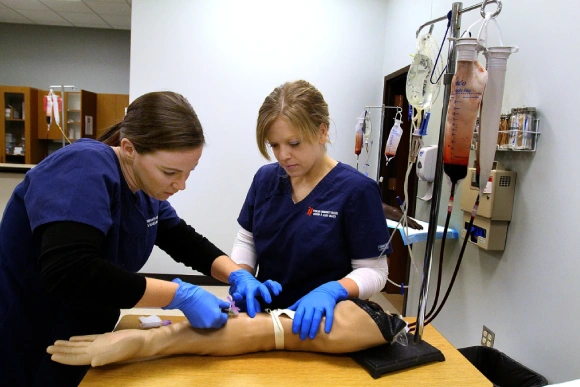Medical Administrative Assistant Vs Medical Assistant: An Overview
The importance of both positions can not be overstated. Here is a quick comparison:
S.No | Aspect | Medical Administrative Assistant | Medical Assistant |
01. | Primary Role | Focuses on tasks such as scheduling, billing, and managing patient records. | Performs both administrative and clinical tasks, including patient care and lab work. |
02. | Work Environment | Typically works in the front office or administrative areas of healthcare facilities. | Works in both administrative and clinical settings, often alongside physicians. |
03. | Patient Interaction | Limited direct patient interaction; mainly handles paperwork and communication. | Frequent direct patient interaction, including taking vitals and assisting doctors. |
04. | Certifications | May require certifications like CMAA (Certified Medical Administrative Assistant). | Often requires certifications like CMA (Certified Medical Assistant) or RMA (Registered Medical Assistant). |
05. | Education Requirements | High school diploma or equivalent; some employers prefer postsecondary certification or training. | Typically, it requires a postsecondary certificate or associate degree in medical assisting. |
Regarding their salaries per annum in the US, they are relatively close.
Let’s understand their job roles in detail to get an idea of what may suit you the best.
Job Duties Of Medical Assistant & Medical Administrative Assistant
The duties of a medical assistant are:
01. Clinical Tasks:
- such as taking vital signs
- Preparing patients for medical exams
- Administering medications
- Conducting basic laboratory tests
- Assisting in medical procedures
02. Administrative Duties:
- Scheduling appointments
- Managing medical records
- Handling patient intake
- Providing patient education
The duties of an administrative medical assistant are:
01. Front Desk Responsibilities
- Meeting and greeting patients
- Scheduling appointments
- Handling billing and insurance claims
- Managing patient records
02. Office Management Tasks
- Maintaining inventory
- Coordinating referrals
- Answering phone calls
- Providing administrative support
COMMON: Both played an integral role in the medical facility, and sometimes, a few of their roles overlap with one another. |
SUMMARY:
S.No | Aspect | Administrative Medical Assistant | Clinical Medical Assistant |
01. | Responsibilities | Handles scheduling, billing, and patient records. | Performs clinical tasks like taking vitals, drawing blood, and assisting with minor procedures. |
02. | Certifications | May require CMAA certification. | Requires CMA or RMA certification. |
03. | Work Environment | Primarily works in the front office. | Works in both clinical and administrative settings. |
Certifications For Medical Assistant & Medical Administrative Assistant
Certifications in any field display skills, knowledge and ability for the specific roles. Having specialized certifications for a medical office assistant and medical office administration will open the doors to many jobs.
01. Medical Assistant Certifications
- Certified Medical Assistant (CMA): The American Association of Medical Assistants (AAMA) provides this certification.
It displays competence in both clinical and front desk duties.
- Registered Medical Assistant (RMA): Provided by American Medical Technologists (AMT), and demonstrates efficiency in various aspects of medical assisting.
02. Administrative Medical Assistant Certifications
- Certified Medical Administrative Assistant (CMAA): The certificate is provided by the National Healthcareer Association (NHA), which specializes in verifying skills and knowledge in administrative duties.
- Certified Billing and Coding Specialist (CBCS): NHA also offers this certification, which mainly focuses on billing and coding in the medical field.
These specialized certifications help secure the best jobs for both positions. But what are the best opportunities? Let’s find out.
Medical Assistant vs. Administrative Medical Assistant Job Outlook
While both roles have exciting job opportunities, specific sectors have greater scope. Let’s look for the best job opportunities for them one by one:
01. Medical Assistant Jobs
According to the statistics from the Bureau of Labor Statistics (BLS), there would be an increase of 19% in the employment rate from 2019 to 2029.
Jobs for them typically are:
- Cardiology Medical Assistant – Helps perform EKGs and monitor vital signs.
- Oncology Medical Assistant – This position involves assisting with cancer treatment, supporting patients undergoing chemotherapy, and managing patient records.
- Orthopedic Medical Assistant – Work with specialists who treat musculoskeletal injuries and conditions. They may assist with casting, wound care, and patient rehabilitation.
- Ophthalmology Medical Assistant – These professionals assist ophthalmologists in providing eye care, performing preliminary eye exams, and assisting with procedures.
- Dermatology Medical Assistant – Working in dermatology involves assisting with skin examinations, procedures, and patient education.
02. Medical Administrative Assistant Jobs
If we consider the data from the Bureau of Labor Statistics (BLS), then there would be an increase of 10% in medical administrative assistant jobs, such as medical secretaries, between 2019 and 2029.
Jobs for them typically are:
- Medical Billing and Coding Specialist – With additional training, you can specialize in billing and coding, a high-demand area with good earning potential.
- Health Information Technician – This role involves managing electronic health records, ensuring accuracy and compliance.
- Medical Office Manager – With experience, you can move into a management role, overseeing medical staff and office operations.
- Healthcare Administration – Further education can lead to roles in healthcare administration, managing departments or facilities.
The Final Call
Now that you understand the differences between these positions.
Choosing the right option based on your interests, skills and career objectives will give you a promising career in the healthcare field. If you are interested, then CCI Training Center provides programs to become medical assistants and medical administrative assistants.
Go through the programs and take your healthcare career to new heights.











